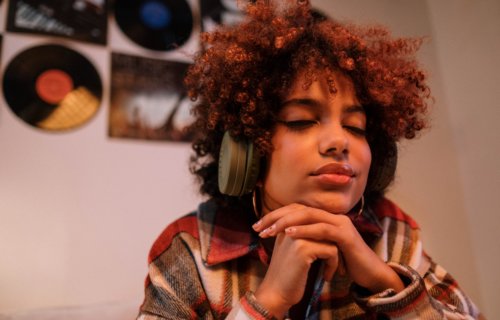Newest psychedelic drug — is sound? How people are using binaural beats to get high
by Chris Melore
Will the next generation of drugs be coming out of your headphones? A new survey is revealing the growing use of sound as a psychedelic drug.
Researchers from RMIT University in Australia say their study looked at the phenomenon of binaural beats, which are sounds that can allegedly trigger a psychoactive effect in the brain. More specifically, binaural beats are illusionary tones created by the brain when someone hears two different sound frequencies in each ear.
The team notes that there is little evidence backing up the claims, and also little research into the effectiveness and safety of listening to these beats. While the new report didn’t look into these issues either, it did reveal how people around the world are using the supposedly psychedelic audio clips.
Most are using them to soothe their mind
Data from the Global Drug Survey 2021 shows 72 percent of respondents use binaural beats to help them relax or fall asleep. Another 35 percent are trying to change their mood. However, 12 percent say they’re using binaural beats to create the same high they get from taking a psychedelic drug.
“Much like ingestible substances, some binaural beats users were chasing a high,” says study lead author Dr. Monica Barratt in a statement. “But that’s far from their only use. Many people saw them as a source of help, such as for sleep therapy or pain relief.”
Dr. Barratt notes that most of the people trying to get high had experience using other psychedelics. The survey included more than 30,000 people in 22 countries, including the United States.
Younger people using digital drugs ‘in multiple countries’
Researchers say these audio tracks often have titles which spell out their intended purpose, focusing on everything from mindfulness and meditation to tracks named after drugs like MDMA and cannabis.
Overall, binaural beat users were younger and were more likely to be using other drugs than those not listening to these clips. Users also admitted that they were trying to “connect with themselves” or “something bigger than themselves” through this experience. One in 20 wanted to reach an “altered state” through listening to binaural beats.
Globally, 16 percent of respondents from the U.S. say they’ve tried it, which is more than double the average in other nations. As for where people are getting their sound fix, most are turning to video streaming sites like YouTube and Vimeo, followed by apps like Spotify.
“It’s very new, we just don’t know much about the use of binaural beats as digital drugs,” Barratt says. “This survey shows this is going on in multiple countries. We had anecdotal information, but this was the first time we formally asked people how, why and when they’re using them.”
Does this change the definition of a drug?
“We’re starting to see digital experiences defined as drugs, but they could also be seen as complementary practices alongside drug use,” the study author adds. “Maybe a drug doesn’t have to be a substance you consume, it could be to do with how an activity affects your brain.”
Despite binaural beat listeners typically being younger people, the study says it’s unlikely these clips will act as a gateway drug to other substances.
“In the survey, we found most people who listen were already using ingestible substances,” Barratt continues. “But that doesn’t discount the need for more research, particularly to document and negate possible harms.”
On a positive note, audio clips like these could find a purpose in the medical world as a new therapy option.
“Evidence is mounting but it’s still unclear, which is why more research is needed into any possible side effects,” the researcher concludes.
The study is published in the journal Drug and Alcohol Review.
___
https://www.braintomorrow.com/2022/03/31/binaural-beats-psychedelic-drug/

